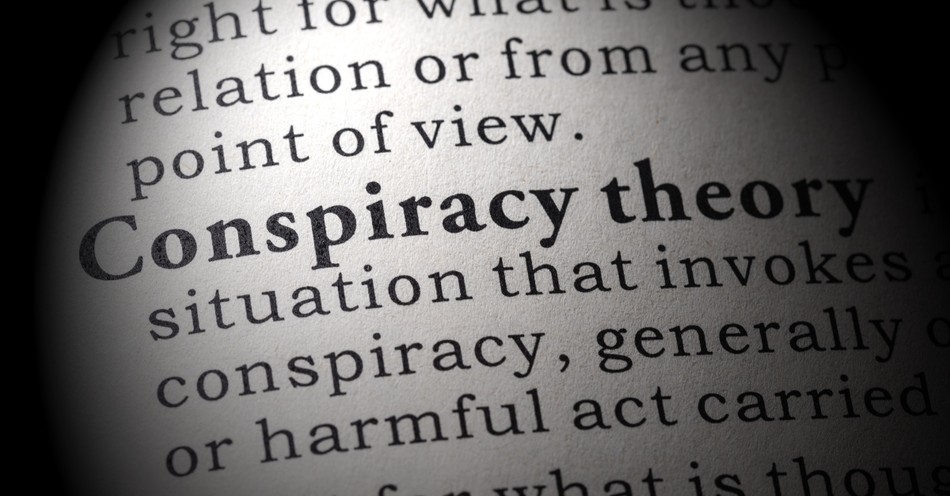In recent years, conspiracy theories have gone from existing on the fringes of the internet to being mainstream positions. From the QAnon movement to the denial of the 2020 presidential election results and theories about the COVID-19 pandemic being a hoax used to control the masses, some political candidates and media pundits have made conspiracy theories an integral part of their platform.
In the midst of that, many Christians have watched their friends and loved ones descend down the rabbit hole of one theory or another, often bringing up what they have been “learning” in casual conversations in ways that can derail a family dinner or social gathering.
This can be disheartening to some, as they feel they have “lost” their loved one to these conspiracy theories perpetuated by unscrupulous online sources that often have violent or apocalyptic overtones.
How are Christians to respond when this happens? How can we interact with those closest to us who have apparently become obsessed with harmful conspiracy theories and do so in a way that is healthy, both for them and for us?
While this isn’t a problem that we can solve easily, here are three ways to maintain healthy relationships with loved ones who have fallen for conspiracy theories.
1. Love Them Where They Are
One of the most transformative aspects of Christian love is that it commits to loving a person for who they are more than for what they can do.
As Christians, we love others, not on the basis of their strengths, their health, or the moral choices they have made. We love them because they are people created in the image of God, people whom God loves so much that he sent his Son to die for them, and whom God offers the promise of life abundant, irrespective of their inability to ever earn it.
This is our model of love. And to be sure, it is often the kind of unconditional love that we feel toward our loved ones who have fallen for conspiracy theories.
That’s why we’re so concerned for them. Only it doesn’t matter how we feel about a person if all they ever experience from us is a sense of disapproval or constant rebuke.
Perhaps the most transformative thing we can do for our relationships with loved ones who have fallen for conspiracy theories is to develop a robust sense of empathy.
This isn’t always the case, but oftentimes, a person will become susceptible to conspiracy theories when they feel as though life is spinning out of control or they become isolated.
Conspiracy theories, as unbelievable and problematic as they can be, provide adherents with both a sense of control and community.
These unfounded theories become alluring because they allow people to explain the unwieldy and often unsettling events of our day in the context of online communities where such theories are shared.
If this is the case, what we must recognize is that our loved ones who have descended down the rabbit hole may be experiencing an ongoing sense of threat or uncertainty. Further, we must be willing to meet them in that place with compassion and kindness.
You don’t need to correct an unfounded claim every time your loved one brings it up. Perhaps it would be better to steer the conversation in a different direction, if possible.
What you also may consider doing is thinking of creative ways to build areas of common ground and shared interest with your loved one that doesn’t involve topics engulfed by conspiracy theories.
When they bring these topics up, pivot the conversation to ask them about themselves. How are things at work? What hobbies or television shows have they recently been enjoying?
Even better would be to find ways to build new memories with these loved ones. Consider organizing a time when you can engage in a fun activity together, such as visiting a museum, watching a theater show they would enjoy, or going mini golfing.
Even better still would be to find ways you can help them with the various needs in their life, whether it is assisting them with home projects, watching their children for an evening, or bringing them a meal.
These kinds of efforts can go a long way in binding your heart to your loved one, and theirs to you, thereby building a relationship that exists outside the arguments of this conspiracy theory or that.
In so doing, you will also build a level of credibility with this loved one, whereby you can begin to gently challenge their more outlandish assumptions.
2. Find Moments to Gently Challenge Their Assumptions
If you have a relationship with your conspiracy-addled loved one that is rooted in genuine Christian love, then you have the authority (and even sometimes the obligation) to gently push back on some of the unfounded claims they espouse.
Tone matters in these conversations. When it comes to challenging assumptions, remember that questions are always better than stern rebuttals. No one has ever been berated into genuinely believing what is true.
So, when a loved one begins to delve into a particular conspiracy theory, discipline yourself to maintain a posture of curiosity. Ask them where they heard this information and how it squares with other information you have heard.
Pose alternate theories, but consider doing so in the form of a question: “could it be that, instead of trying to control us during the pandemic, government leaders were doing the best they could with the information they had and didn’t always make the best decisions?”
This won’t always work. You won’t always cause your loved one to question what they have come to believe in the course of one conversation. And that’s okay. Simply focus on cultivating healthy interactions rather than heated debates.
This will require that you hold your tongue in certain instances, and you will need to exercise wisdom in knowing when to be more unequivocal in your refutation of a particular data point.
But as long as you are making an effort to be respectful and genuinely listen as much as you speak, your loved one will be far more likely to continue in dialogue.
What’s more is that, given some time, they just might start to listen to you and begin to temper certain stances.
3. Pray for Them
At the end of the day, no matter how kind we are or how skilled we are in the arts of conversation and diplomacy, we simply don’t have the ability to change someone’s heart. We can’t change their mind by sheer force of will. We can’t “fix” them. And that isn’t our job.
Our job is to love them. And one of the most loving things you can do for a person is to pray for them. So, commit yourself, above all else, to doing that.
Pray that your loved one would grow less suspicious of the counsel you offer. Pray that God would meet them in the underlying places of anxiety and uncertainty that have led them to embrace these conspiracy theories.
Pray that you could be a beacon of both grace and truth in their life that would contribute to their letting go of unhealthy obsessions.
Pray that the love of Jesus would be on full display in your relationship with your loved one whom you have “lost” to conspiracy theories.
And as you do the work of loving them well, may you come to realize that they are not truly lost, and there is just as much hope for healing in their life as there is for yours.
For further reading:
How Should Christians Respond to Conspiracy Theories?
QAnon, Conspiracy Theories, & the Church: Faith and Fear Don’t Mix
Why Has God Not Given Us the Spirit of Fear?
Photo Credit: ©iStock/Getty Images Plus/Devonyu




.jpg)